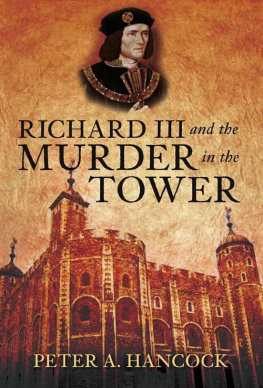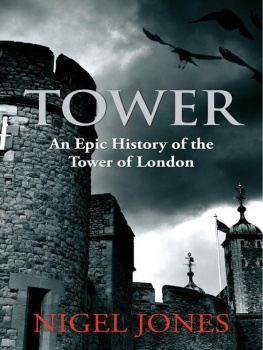P RAISE FOR R ICHARD III AND THE M URDER IN THE T OWER
well written and well argued
Livia Visser-Fuchs, The Ricardian
Its like Hancock is speaking with me. This book is highly readable and thoroughly engaging.
Joan Szechtman, author of This Time
A cracking read. Hancock not only knows his stuff, but he is able to present his theories lucidly, making what is frankly quite a difficult argument easy and entertaining to understand A great book which any Ricardian will love.
The Ripperologist
PETER A. HANCOCK
This text presents an analysis of the events and circumstances which precipitated the execution of William, Lord Hastings at the Tower of London on Friday 13 June 1483. This investigation goes directly to the heart of the legitimacy of the assumption of the throne by Richard, Duke of Gloucester, who thus became the controversial monarch Richard III.
Cover illustrations : (front, upper) King Richard III, by an unknown artist
World History Archive; (front, lower) the Tower of London.
First published in 2009
The History Press
The Mill, Brimscombe Port
Stroud, Gloucestershire, GL 5 2 QG
www.thehistorypress.co.uk
This ebook edition first published in 2011
All rights reserved
Peter A. Hancock, 2009, 2011, 2011
The right of Peter A. Hancock, to be identified as the Author of this work has been asserted in accordance with the Copyrights, Designs and Patents Act 1988.
This ebook is copyright material and must not be copied, reproduced, transferred, distributed, leased, licensed or publicly performed or used in any way except as specifically permitted in writing by the publishers, as allowed under the terms and conditions under which it was purchased or as strictly permitted by applicable copyright law. Any unauthorised distribution or use of this text may be a direct infringement of the authors and publishers rights, and those responsible may be liable in law accordingly.
EPUB ISBN 978 0 7524 6917 1
MOBI ISBN 978 0 7524 6918 8
Original typesetting by The History Press
Contents
Acknowledgements
What I have presented is very much reliant upon the hard work and achievements of others, and thus my first duty is to acknowledge and recognise these individuals and their collective efforts and contributions. With respect to my initial account of the events of the summer of 1483, I am very much indebted to the work of the late Charles Wood, whose 1975 article has been of major importance. Unfortunately, Woods account is built around the re-dating of the death of William, Lord Hastings that was proposed by Alison Hanham at the time he was writing his paper. As will be evident, I think this re-dating is in error and Woods belief in this altered date led him to make a number of assumptions and interpretations which I have rejected here. Nevertheless, the evidentiary basis he gives for the events of that summer are, I believe, predominantly sound, and thus his factual information has been used extensively here. That the precontract is the pivotal issue in the way that the events of that summer played out is a prime motivator for the present text. This line of reasoning leads us directly to a consideration of Eleanor Talbot, Lady Butler. In examining the life and history of Lady Eleanor, the recent work of John Ashdown-Hill has proved critical. He has undoubtedly advanced our knowledge of this crucial individual by an order of magnitude and much of what I have to say here about Lady Eleanor comes from his series of outstanding papers. Any additional linkages that I have managed to find are directly contingent upon this base of knowledge which Ashdown-Hill has laid down.
Our knowledge of William Catesby depends in large part on the foundational articles by Roskell and Williams, and I have naturally relied on these important sources. However, the history of the Catesby family at this time has most recently been presented in illuminating detail by Payling and I am greatly indebted to his excellent chapter as a major basis of my observations on William here. Further, the recent text edited by Bertram, containing Paylings chapter, has provided many insights into the man which have been based upon emerging information about him and his immediate family. I am indebted to the various authors who contributed to this edited work for their observations and insights. The recently published monograph on Catesby by Judith Dickson has also proved critical for my evaluation of this fascinating character. In respect to William, Lord Hastings, Dunhams article has been helpful in deriving the final interpretation and account that I have offered, as Turners text on the Hastings Hours. The nineteenth-century transcript of Dugdales manuscript on the Hastings family, held at the Huntington Library (MS HM, 52001), has also formed a part of the foundation on William, Lord Hastings, the victim of the present sequence of events. This latter is, of course, very much contingent upon the relationships between Richard, Hastings and Catesby.
The foregoing acknowledgements have largely been in relation to specific sources; however, my overall hypothesis is founded upon the whole pantheon of Ricardian scholarship. This must inevitably reflect the important works of Kendall and Ross, but especially a number of stalwarts of the Richard III Society who continue the battle for the truth of the man and monarch. I am always grateful to Geoffrey Wheeler, who continues to inform and inspire, as well as to luminaries of the Ricardian Society who, unfortunately, here remain to me just revered names. My very grateful thanks also go to Randy Williams for his untiring help with all of the illustrations in this book. On a more local level, I am always grateful to Carole Rike and Jo Anne Ricca, publishers and editors of respected journals, who are kind enough to feature my observations, but especially to Virginia Poch, (who kindly generated the index for the present text) Janice Wentworth and Richard Endress, who are my immediate fellow Ricardians who spread the message of calumny among the populous of central Florida. I am most grateful for their companionship and friendship loyalte me lie .
P. A. Hancock
Orlando, Florida
Setting the Scene
All the worlds a stage
How many of us have looked at the calendar and, with a mild to significant degree of trepidation, noted that the 13th of the coming month coincided with a Friday? Even in todays technological world, we still look on Friday 13th as potentially an unlucky occasion. The precise origin of this superstition is uncertain; however, a strong candidate would be Friday 13 October 1307. For it was on this date that Phillippe IV, the Fair, King of France, co-ordinated a state-wide attack on the Order of the Knights Templar. Arrests were made throughout the country and the Orders functional presence in France was effectively obliterated that day. Subsequently, a number of its members were put to torture and eventual execution, while Templars throughout other parts of Europe were subject to state-sponsored oppression. The origin of the unlucky nature of Friday 13th may well have begun with this event. Whether Friday 13th was considered unlucky in 1483 is difficult to ascertain. However, a pivotal event took place that day which marked a turning point in the thread of English history. This day proved the culmination of a sequence of events from the immediately preceding months and years, and its effects penetrated well into the future to change the balance of power and the path of the realms progress. It is not an exaggeration to say that the fall of the Plantagenet dynasty and the rise of the House of Tudor was decided that day, although the actors then present on that stage could, of course, not have known this. To understand what went on that day and why, we have to probe into that past and the causes of what was, essentially, a family dispute which got out of hand.













